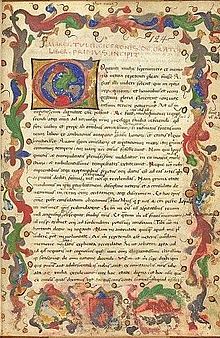
A | B | C | D | E | F | G | H | CH | I | J | K | L | M | N | O | P | Q | R | S | T | U | V | W | X | Y | Z | 0 | 1 | 2 | 3 | 4 | 5 | 6 | 7 | 8 | 9

De Oratore (On the Orator) is a dialogue written by Cicero in 55 BC. It is set in 91 BC, when Lucius Licinius Crassus dies, just before the Social War and the civil war between Marius and Sulla, during which Marcus Antonius (orator), the other great orator of this dialogue, dies. During this year, the author faces a difficult political situation: after his return from exile in Dyrrachium (modern Albania), his house was destroyed by the gangs of Clodius in a time when violence was common. This was intertwined with the street politics of Rome.[1]
Amidst the moral and political decadence of the state, Cicero wrote De Oratore to describe the ideal orator and imagine him as a moral guide of the state. He did not intend De Oratore as merely a treatise on rhetoric, but went beyond mere technique to make several references to philosophical principles. Cicero believed that the power of persuasion—the ability to verbally manipulate opinion in crucial political decisions—was a key issue and that in the hands of an unprincipled orator, this power would endanger the entire community.
As a consequence, moral principles can be taken either by the examples of noble men of the past or by the great Greek philosophers, who provided ethical ways to be followed in their teaching and their works. The perfect orator shall be not merely a skilled speaker without moral principles, but both an expert of rhetorical technique and a man of wide knowledge in law, history, and ethical principles. De Oratore is an exposition of issues, techniques, and divisions in rhetoric; it is also a parade of examples for several of them and it makes continuous references to philosophical concepts to be merged for a perfect result.
Choice of the historical background of the dialogue
| Part of a series on |
| Rhetoric |
|---|
 |
At the time when Cicero wrote the dialogue, the crisis of the state concerned everyone. The dialogue deliberately clashes with the quiet atmosphere of the villa in Tusculum. Cicero tries to reproduce the feeling of the final peaceful days in the old Roman republic.
Despite De Oratore (On the Orator) being a discourse on rhetoric, Cicero has the original idea of inspiring himself to Plato's Dialogues, replacing the streets and squares of Athens with a nice garden of a country villa of a noble Roman aristocrat. With this fanciful device, he avoided the arid explanation of rhetoric rules and devices. The work contains the second known description of the method of loci, a mnemonic technique (after the Rhetorica ad Herennium).
Book I
Introduction
- Cicero begins his book by addressing this as a conversation to his brother. He continues on reflecting about so little time left in his life to be dedicated to noble studies.
Unfortunately, the deep crisis of the state (the civil war between Marius and Sulla, the conjuration of Catilina and the first triumvirate, that excluded him from the active political life) has wasted away his best years.[2]
Education of the orator
- Cicero explains that he wants to write something more refined and mature than what he had previously published in his younger and more immature days in his treatise De Inventione.[3]
Several eminent men in all fields, except oratory
- Cicero questions why, despite the fact that many people have exceptional abilities, there are so few exceptional orators.
Many are the examples of war leaders, and will continue to be throughout history, but only a handful of great orators. - Countless men have become eminent in philosophy, because they have studied the matter thoroughly, either by scientific investigation or using dialectic methods.
Each philosopher has become excellent in his individual field, which includes oratory.
Nevertheless, the study of oratory has attracted the smallest number of distinguished men, even less than poetry.
Cicero finds this amazing, as the other arts are usually found in hidden or remote sources;
on the contrary, all of oratory is public and in plain view to mankind, making it easier to learn.[4]
Oratory is an attractive but difficult study
- Cicero claims that in Athens, "where the supreme power of oratory was both invented and perfected," no other art study has a more vigorous life than the art of speaking.
After Roman peace had been established, it seemed as though everyone wanted to begin learning the eloquence of oral rhetoric.
After first trying rhetoric without training or rules, using only natural skill, young orators listened and learned from Greek orators and teachers, and soon were much more enthusiastic for eloquence. Young orators learned, through practice, the importance of variety and frequency of speech. In the end, orators were awarded with popularity, wealth, and reputation.
- But Cicero warns that oratory fits into more arts and areas of study than people might think.
Text je dostupný za podmienok Creative Commons Attribution/Share-Alike License 3.0 Unported; prípadne za ďalších podmienok. Podrobnejšie informácie nájdete na stránke Podmienky použitia.
Antropológia
Aplikované vedy
Bibliometria
Dejiny vedy
Encyklopédie
Filozofia vedy
Forenzné vedy
Humanitné vedy
Knižničná veda
Kryogenika
Kryptológia
Kulturológia
Literárna veda
Medzidisciplinárne oblasti
Metódy kvantitatívnej analýzy
Metavedy
Metodika
Text je dostupný za podmienok Creative
Commons Attribution/Share-Alike License 3.0 Unported; prípadne za ďalších
podmienok.
Podrobnejšie informácie nájdete na stránke Podmienky
použitia.
www.astronomia.sk | www.biologia.sk | www.botanika.sk | www.dejiny.sk | www.economy.sk | www.elektrotechnika.sk | www.estetika.sk | www.farmakologia.sk | www.filozofia.sk | Fyzika | www.futurologia.sk | www.genetika.sk | www.chemia.sk | www.lingvistika.sk | www.politologia.sk | www.psychologia.sk | www.sexuologia.sk | www.sociologia.sk | www.veda.sk I www.zoologia.sk
